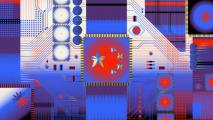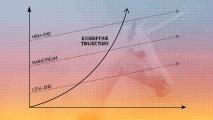
The Digital Frontier
30 years ago, the Internet opened up a new frontier, and today we’re all citizens of a digital Wild West, where how we live, work and govern is changing everyday.
More
America tried to ban fake photos in 1912
Mistakes made by the US government 100 years ago could help us determine the best way to regulate AI-manipulated images and videos today.
Skype is dead. Here’s why it almost wasn’t born.
Threatened by their low cost, traditional telephone companies tried to get long-distance internet phone services banned in the 1990s.
All PCs will be AI PCs “pretty soon,” says Intel exec
Manufacturers are now equipping their PCs with the hardware needed to run the latest AI applications locally. Here’s what that means for you.
We’re able to create new creatures through gene editing. What’s stopping us?
The question isn’t whether we can sculpt new life. The question is what comes next.
Pantheon creator Craig Silverstein on uploading our brains to the internet
How the cult hit sci-fi show imagines a “techno-realist” future.
Google’s $1 billion bet on Africa’s digital future
Just 37% of sub-Saharan Africans use the internet today, but Google predicts the next 10 years will be the region’s “digital decade.”
Can humans purge the bots without sacrificing our privacy?
A group backed by Sam Altman is pursuing the creation of “personhood credentials” that would prove an internet user is a real person.
How tech is turning science into a hobby
From astronomy to video games, consumer technology is helping people pursue their interests while also advancing community science.
Silicon chips are no longer sustainable. Here’s what’s next.
To take our tech to the next level, we need a more energy-efficient semiconductor. Gallium nitride could be it.
Is this the biggest industrial espionage campaign in history?
The cat-and-mouse game between China and the world’s semiconductor companies is already having enormous consequences.
AI is now designing chips for AI
AI-designed microchips have more power, lower cost, and are changing the tech landscape.
AI chatbots may ease the world’s loneliness (if they don’t make it worse)
AI chatbots may have certain advantages when roleplaying as our friends. They may also come with downsides that make our loneliness worse.
The next big tech trend will start out looking like a toy
In “Read, Write, Own: Building The Next Era of the Internet,” investor Chris Dixon explains why the biggest trends often go overlooked.
My anxious generation: The unforeseen toll of a digital childhood
In this op-ed, columnist Rikki Schlott draws from personal experience to argue that a digital childhood is a childhood squandered.
Replit CEO Amjad Masad on bringing the next 1 billion software creators online
Freethink spoke with Masad about the future of software development, the outsized power of Silicon Valley, and the absurdity of the AI extinction theory.
Potato chips or heroin? The debate on social media and mental health
Experts disagree on whether social media causes mental health issues in adolescents despite looking at the same data. Here’s why.
Constitutional warning shot for social media “deplatforming” laws
Can the government tell private websites what they have to publish?
You’re thinking of the metaverse all wrong, says Matthew Ball
Rumors of the metaverse’s demise have been greatly exaggerated.
Hugo Mercier says we’ve been misinformed about misinformation
Cognitive scientist Hugo Mercier argues the problem isn’t that people are too gullible but too stubborn.
Ray Kurzweil explains how AI makes radical life extension possible
Life expectancy gains in developed countries have slowed in recent decades, but AI may be poised to transform medicine as we know it.
Get inspired with the most innovative stories shaping the world around us.





















